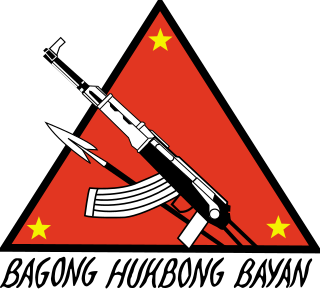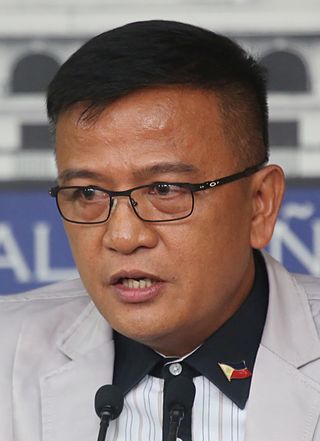
The Armed Forces of the Philippines (AFP) are the military forces of the Philippines. It consists of three main service branches; the Army, the Air Force, and the Navy. The President of the Philippines is the Commander-in-Chief of the AFP and forms military policy with the Department of National Defense, an executive department acting as the principal organ by which military policy is carried out, while the Chief of Staff of the Armed Forces of the Philippines serves as the overall commander and the highest-ranking officer in the AFP.

The New People's Army, abbreviated NPA or BHB, is the armed wing of the Communist Party of the Philippines (CPP). It acts as the CPP's principal organization, aiming to consolidate political power from what it sees as the present "bourgeois reactionary puppet government" and to aid in the "people's democratic revolution". Founded on March 29, 1969, by the collaboration of Jose Maria Sison and former members of the Hukbalahap led by Bernabe Buscayno, the NPA has since waged a guerrilla war based on the Maoist strategy of protracted people's war. The NPA is one of the key figures in the ongoing Communist rebellion in the Philippines, the longest ongoing conflict in the country.
The Philippines was under a state of emergency, announced by presidential spokesperson Ignacio Bunye on the morning of February 24, 2006, by the virtue of Proclamation No. 1017. This occurred after the government claimed that it foiled an alleged coup d'état attempt against the rule of President Gloria Macapagal Arroyo earlier that same day. State security services also claimed that it had arrested a general who was involved in the coup attempt. President Arroyo lifted the state of emergency on March 3, 2006, by the virtue of Proclamation No. 1021.

Gregorio "Gringo" Ballesteros Honasan II, is a Filipino politician and a cashiered Philippine Army officer who led unsuccessful coups d'état against President Corazon Aquino. He played a key role in the 1986 EDSA Revolution that toppled President Ferdinand Marcos, and participated in the EDSA III rallies in 2001 that preceded the May 1 riots near Malacañang Palace.
On July 27, 2003, the Oakwood mutiny was staged by a group of about 300 armed defectors from the Armed Forces of the Philippines (AFP) and the Philippine National Police (PNP) led by Army Capt. Gerardo Gambala and Navy Lt. Senior Grade Antonio Trillanes IV against the Arroyo administration. The group forcibly seized and occupied Oakwood Premier in Glorietta, Makati for almost 20 hours. They expressed grievances against the government's supervision of the military, and demanded the resignation of Defense Secretary Angelo Reyes, PNP Director General Hermogenes Ebdane, and AFP Chief of Intelligence Service Victor Corpus; They also aired their grievances against the military establishment and anomalies on the AFP. The mutiny was covered heavily by the local press, who dubbed the group as "Magdalo" in reference to their insignia, which alludes to the Magdalo faction during the Philippine Revolution, despite the group officially calling themselves "Bagong Katipuneros". The mutiny ended after the government successfully negotiated with the group. Several prominent participants of the mutiny, including Trillanes and Gambala, were later charged.

Arturo "Boy" Tiongson Enrile was the Secretary of the Department of Transportation and Communications from 1997 to 1998. He also served as the 24th Chief of Staff of the Armed Forces of the Philippines from 1994 to 1996.

Nicanor Escalona Faeldon is a Filipino former Marine who served as the director-general of the Bureau of Corrections under the Duterte administration from November 21, 2018, until he was fired in September 2019. He served as Commissioner of the Bureau of Customs from June 30, 2016, to August 21, 2017. He was a captain in the Philippine Marines who gained national and international attention when he participated as one of the alleged leaders of the incident known as the Oakwood mutiny in 2003.

The Manila Peninsula siege occurred on November 29, 2007, at The Peninsula Manila hotel in Makati, Philippines. Senator Antonio Trillanes IV, Brigadier General Danilo Lim, and 25 other Magdalo Group officers walked out of their trial for the 2003 Oakwood mutiny coup attempt and marched through the streets of Makati. The mutineers called for the ousting of President Gloria Macapagal Arroyo, and seized the Rizal function room on the second floor of the Manila Peninsula Hotel along Ayala Avenue. Former Vice-president Teofisto Guingona, Jr. as well as some of the soldiers from the Armed Forces of the Philippines joined the march to the hotel.
The 2008 Battle of North Cotabato was a military confrontation between the Armed Forces of the Philippines and a rogue Moro Islamic Liberation Front (MILF) faction under the command of Umbra Kato in North Cotabato, a province of Mindanao, in the Philippines.

The Magdalo Group was a group of dissident soldiers who staged the unsuccessful Oakwood mutiny. Made up of junior officers of all branches of the Armed Forces of the Philippines (AFP), the group took over the Oakwood Premier Ayala Center in Makati and demanded the resignation of senior officers in the AFP and members of the Arroyo government, including the President herself. The group called themselves "Bagong Katipuneros", but the local press continued referring to them as the Magdalo Group.

Danilo "Danny" Delapuz Lim was a Filipino soldier who served as Chair of the Metropolitan Manila Development Authority from 2017 until his death in 2021. He was incarcerated at Camp Crame in Quezon City from 2006 to 2010 for rebellion charges and an attempted coup d'état. After more than 4 years in prison, Lim was granted temporary freedom by the Armed Forces of the Philippines on May 31, 2010.

The Chief of Staff of the Armed Forces of the Philippines (CSAFP) is the highest-ranking military officer and the head of the Armed Forces of the Philippines (AFP), including all service branches under its command. The position is usually held by a four-star rank of General or Admiral. Its direct equivalent in the US Armed Forces is the Chairman of the Joint Chiefs of Staff. Unlike its US counterpart, which is merely supervisory, the Chief of Staff has complete operational control within the military hierarchy and is responsible for the overall operations of the AFP.
The Reform the Armed Forces Movement, also referred to by the acronym RAM, was a cabal of officers of the Armed Forces of the Philippines (AFP) known for several attempts to seize power in the Philippines during the 1980s and 1990s. In 1986, some of these officers launched a failed coup d'état against Ferdinand Marcos, prompting a large number of civilians to attempt to prevent Marcos from wiping the RAM rebels out. This eventually snowballed into the 1986 People Power revolution which ended the dictatorship of Ferdinand Marcos and forced him into exile. RAM later attempted six coups d'état against the administration of Corazon Aquino.

Eduardo San Lorenzo Oban Jr is a graduate of the Philippine Military Academy Class of 1979 and the former Chief of Staff of the Armed Forces of the Philippines. His term as chief of staff began on March 6, 2011 when he succeeded General Ricardo David and ended when he was succeeded by General Jessie Dellosa. On February 22, 2014, Oban was appointed by President Aquino to head the Visiting Forces Agreement Commission.

The Battle of Binakayan–Dalahican was a simultaneous battle during the Philippine Revolution that was fought on November 9–11, 1896 that led to a decisive Filipino victory. The twin battle took place at the shores of Binakayan, in the town of Cavite Viejo ; Dalahican and Dagatan in Noveleta; and, to minimal extent, in Imus and Bacoor towns in Cavite, Philippines that lasted for two days before the Spanish army retreated demoralized and in disarray. The result of the battle was the first significant Filipino victory in the country's history.
Operation Darkhorse was an offensive against the Bangsamoro Islamic Freedom Fighters (BIFF) launched by the Armed Forces of the Philippines on January 27, 2014.
Vicente "Vic" Sumajit Santos Jr. was a colonel of the Philippine Army – Armed Forces of the Philippines (AFP). He is the author of several military books and other publications, as well as the founding president of Kapatiran ng mga Kawal na Makawikang Pilipino (KAKAMPI).
Ariel Oliva Querubin is a retired Philippine Marine Corps officer and a recipient of the Philippines' highest military award for courage, the Medal of Valor. He is the most decorated soldier in the Philippines.

Victor Navarro Corpus was a Filipino military officer and public official best known for his 1970 defection from the Armed Forces of the Philippines (AFP) to the New People's Army of the Communist Party of the Philippines during the authoritarian regime of Ferdinand Marcos, for his defection from the NPA in 1976, his return to the AFP after the 1986 People Power Revolution, and his later role as chief of the Intelligence Service of the Armed Forces of the Philippines (ISAFP).










